Digital Divide continues to limit low-income families in Multnomah County
Portland nonprofit Free Geek works to shrink the digital divide with historic investment from Comcast and the Mt. Hood Cable Regulatory Commission
For many people, the internet is the answer to just about everything these days. Looking for a job? Going online is really the only way to search and apply anymore. Need to access school resources, take a class online or submit your homework? Students need the equipment and the know-how to do it and succeed. Want to look for an apartment or house? The internet is the answer.
“An Internet connection is now more critical than ever,” said Juan Muro, executive director of Free Geek, a Portland nonprofit that seeks to bridge the digital divide by connecting more people to the Internet and getting devices into the hands of people who need them. “It’s essential for folks to be able to find jobs, study, advance any career or educational goals, stay connected with the family and just participate in everyday activities.”
And yet, as ubiquitous as the internet has become, not everyone is able to utilize it and capitalize on its benefits. This reality is embodied in the concept of digital equity, which is the idea that everyone should have equal access to digital technology and online resources. The unfortunate reality is, not everyone does.
Technology gaps
According to a 2018 survey, 32,000 households in Multnomah County did not subscribe to internet service and had incomes of less than $75,000 per year. In addition, more than 16,200 households in the county did not have computing devices of any kind.
On top of that, a 2020 feasibility study in Multnomah County looking into the prospect of county-wide broadband internet service found that many community members lacked hardware, software and knowledge about key digital tools. Low-income residents are even less connected digitally and more impacted by the lack of digital equity. What’s more, nearly 2,800 homes and businesses were entirely underserved in pockets of northwest and east Multnomah County.
In most cases, it’s not about broadband access or affordability; it’s a plain lack of awareness about what resources might be available to people who are not connected digitally. For example, Muro said there are about 30,000 individuals in Multnomah County who qualify for the federal Affordable Connectivity Program, which provides discounts for monthly internet service, but who have not signed up for it.
“As technology advances, as we become so much more dependent on digital tools, we forget that a group of people don’t have even the basic necessities or understand how to use technology, how to actually adopt it to be able to prosper,” Muro said.
Making a digital difference
Organizations like Free Geek have been trying to close that digital equity gap. The nonprofit, founded in 2000 as more of a technology recycling and reuse outfit, has since broadened its focus to include digital inclusion programming to support education, free technology access, digital literacy and workforce development. Exeuctive Director Juan Muro said Free Geek, in partnership with various partner companies, serves between 1,500 and 2,000 people each year with everything from free internet service and laptops to digital navigators, who teach people how to use the internet and other digital tools.
In December 2023, Comcast and the Mt. Hood Cable Regulatory Commission (MHCRC) announced a new $2 million investment in Free Geek. This investment will help the most disconnected communities in Multnomah County get online and receive the resources, devices and technology education needed to advance digital skills for education and work, enhance economic mobility, and promote digital equity.
“We see firsthand that the digital divide continues to be a persistent challenge for communities in Multnomah County. East Portland, Gresham, Fairview, Wood Village, and Troutdale are home to some of our most disconnected communities. More than 3,000 residents do not own a computer and many others don’t know how to use it effectively,” said Juan Muro, Executive Director of Free Geek. “This investment will ensure that these families have the same benefits as others and their children have access to online resources to be successful in school.”
Free Geek will use the investment to help bridge the digital divide by working to connect more people to the internet and getting devices into the hands of people who need them. In addition, Free Geek will serve as consultants to enable community partners to expand their own digital equity programs in alignment with the region’s Digital Equity Action Plan, which is focused on helping the most vulnerable communities in Portland and Multnomah County.
“All Oregonians should be able to access the internet in order to connect with educational, health care, and economic opportunities,” Governor Tina Kotek said. “Together, with public and private partners, we are working towards a common purpose of empowering individuals to get online, enhance digital skills, and advance economic mobility.”
Free Geek will also bring additional capacity to its network of community partners as they work to remove barriers to broadband adoption.
“The MHCRC has a long history of advocating for digital equity through access to and use of telecommunications technology through public-private partnerships. We are excited to be able to partner with Comcast and Free Geek to bring this resource to the community at a time when funding and support for local efforts in urban communities is limited,” said Julia DeGraw, Chair of the MHCRC.
This announcement is the latest example of investment in Oregon under Comcast’s Project UP program, a comprehensive initiative to advance digital equity and help build a future of unlimited possibilities.
In September, Free Geek partnered with the city of Portland and other groups to donate 500 laptops and 12 months of free internet to immigrants and refugees who are clients of the Immigrant and Refugee Community Organization, which supports immigrants, refugees and diverse community members in Oregon and Southwest Washington. And in July, Comcast donated $60,000 and launched a new Lift Zone, with free high-speed Wi-Fi service, at Free Geek’s Center for Technology Education & Digital Equity in East Portland. The telecommunications company also invested $240,000 in a digital navigation campaign aimed at helping increase internet adoption through resource awareness, digital skills programs and device assistance.
“While high-speed internet is widely available in Multnomah County, the unfortunate reality is that not everyone has the resources and digital skills they need to benefit from it,” said Comcast Pacific Northwest Region Senior Vice President Rodrigo Lopez. “By continuing our partnership with Free Geek, we are creating a more prepared and inclusive workforce and ensuring that communities in the Greater Portland area are not left behind.”
Such efforts, Muro said, are a step toward closing the digital divide. Yet there is still more that needs to be done.
“Most people cannot imagine not having easy access to the internet, to the world via their laptop or phone,” he said. “Only by helping families adopt the tools and learn how to use them will we truly be able to advance digital equity in Multnomah County.”
For more information about Free Geek please visit: www.freegeek.org/digitalequity

DIGITAL EQUITY
As the world becomes more digital, it’s Comcast’s goal to ensure that everyone can participate and excel in today’s society. We have been committed to creating and supporting digital equity within the communities we serve for more than 10 years. Comcast invested millions of dollars in 2023 to advance digital equity and promote diversity, equity, and inclusion in the Pacific Northwest.

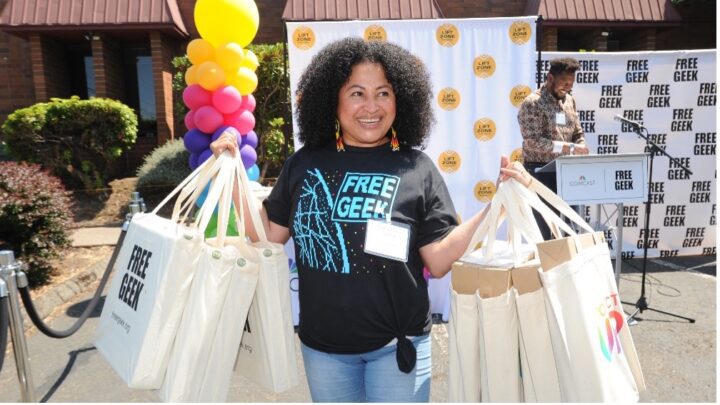
Digital Navigators
In 2023, Comcast increased its funding and support to Digital Navigators, affiliated with trusted community organizations trained to help people access the internet, use devices, and build digital skills. Digital Navigators are critical to closing the digital divide and reducing socioeconomic inequalities by helping more people get online, according to the findings of a Boston Consulting Group study.
Digital Navigators help income-constrained individuals and households sign up for low-cost, high-speed broadband through Internet Essentials. Digital Navigators also help people in need get a device and connect to skills training and other resources.
Of people who’ve received help from Digital Navigators, 1 in 3 found a new job or increased their income, and 40% received support with basic needs like food, rent, and housing. That is why Comcast invests directly in community-based initiatives and programs to support Digital Navigator and broadband adoption efforts in the Pacific Northwest as part of Project UP, the company’s comprehensive initiative to advance digital equity.
Comcast’s Digital Navigator partners in Oregon and Washington include Free Geek, United Congolese Community Organization of Oregon, Community Services Network, Native American Youth and Family Center, and more. Our work with these partners helps launch and scale up their efforts to help expand access to digital skills programs and get people in the Pacific Northwest connected to the internet.

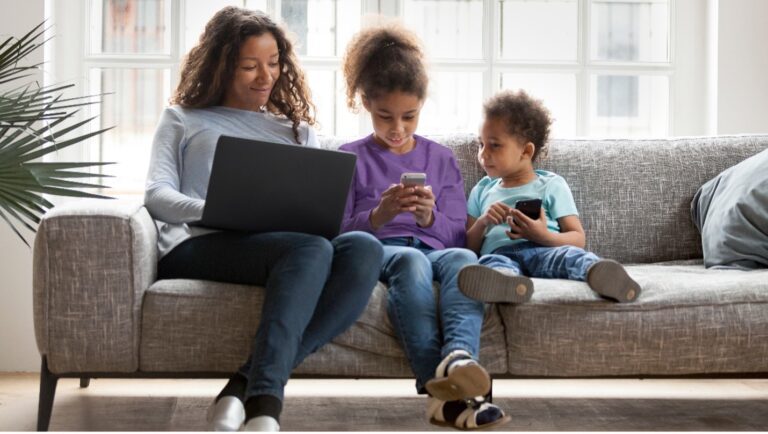
Internet Essentials
Connecting people to the internet and the online resources it provides are critical priorities for Comcast. The gap between people who benefit from using online resources and those who are not is called the digital divide, and it exists in underserved communities throughout Washington state. For over a decade, we’ve worked hard to address this challenge and have connected more than 103,000 households in Oregon to high-speed Internet at home, many for the first time, through our Internet Essentials program.
Internet Essentials addresses the barriers to internet adoption through free digital literacy training resources, the option to purchase a discounted computer, and low-cost, high-speed Internet for under ten dollars a month, plus tax. Through this program, we’ve been able to connect students, families, and communities needing affordable internet resources. But more needs to be done.

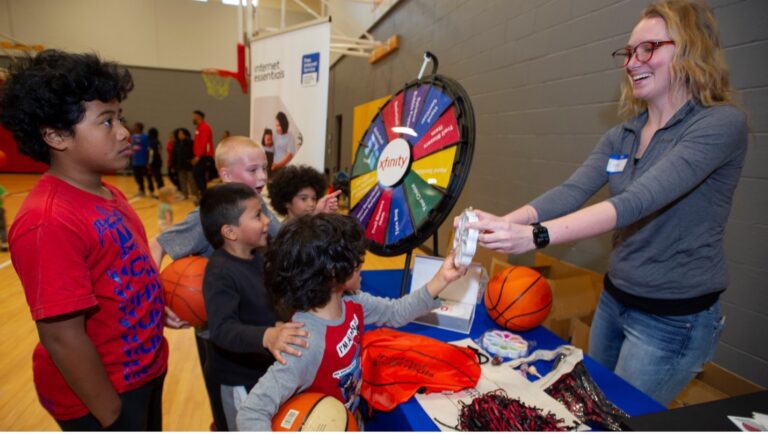
Community Partners
Internet connectivity is more important now than ever before and we work with dozens of partners across Oregon, including nonprofits and city leaders, to provide digital skills training so everyone can benefit from the opportunities that come from being online. In the last three years, Comcast has contributed $5.8 million to nonprofits in Oregon. Working side by side with local partners like Boys & Girls Clubs, Free Geek, Hacienda CDC, Asian Pacific American Network of Oregon, Native American Youth & Family Center, The Arc of Lane County, Self Enhancement Inc., Girls Inc., and many more, we are seeking to advance digital equity throughout the state.

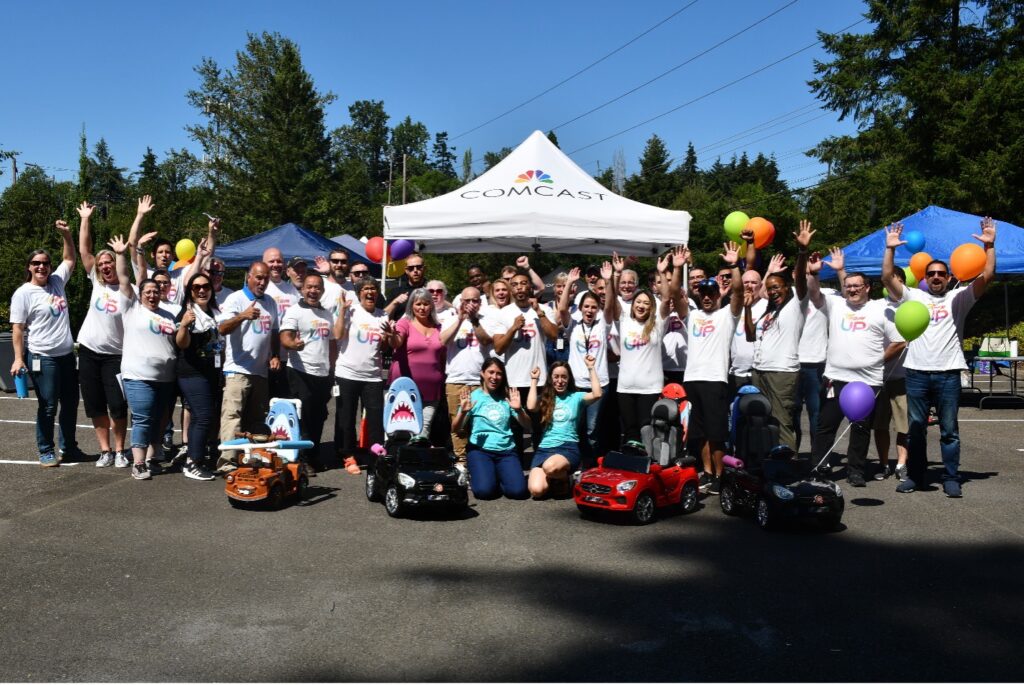
The Communities We Serve
Comcast seeks to develop deep community partnerships that help promote goodwill and create a lasting impact on our state. We serve and partner with groups including, but limited to, Women, LGBTQ, Hispanic/Latinx, Indigenous/Urban India, Black Americans, Asian Pacific Americans, Veterans and Military Families, Individuals with Intellectual and Developmental Disabilities (I/DD) and low-income/vulnerable families.

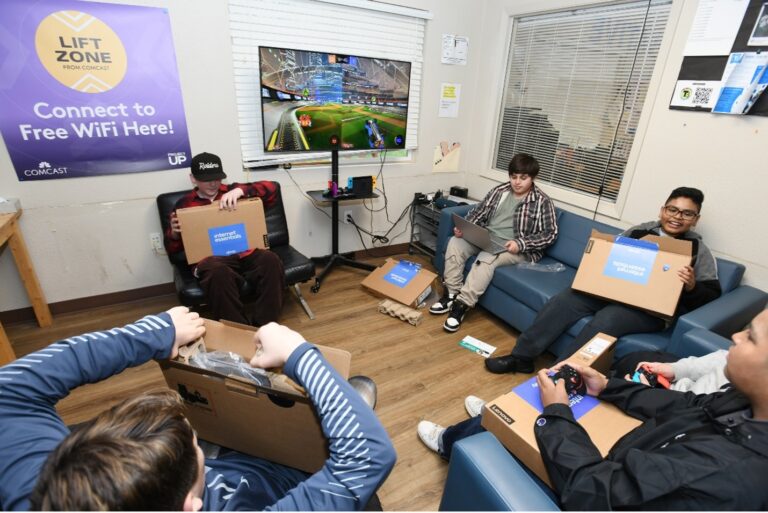
Lift Zones
We know that thousands of Oregonians also depend on community centers for access to the Internet, and our Lift Zone initiative aims to address that need. Through our Lift Zone initiative, we have equipped nearly Lift Zones with free internet service throughout the state.
Lift Zones provide hundreds of Oregon residents with locations to access online education, healthcare, and employment resources. Some of Lift Zones have also receive state-of-the-art technology makeovers from Comcast, including new laptops and technology that will help our community partners offer job skills training, education, computer classes, internships, and more. Find Lift Zones in Oregon.

This initiative will provide free hotspot connectivity. Providing access to hundreds of hours of educational and digital skills content to help families and site coordinators navigate online learning. Lift Zones complement Comcast’s Internet Essentials program, which, since 2011, has helped connect more than 400,000 low-income people in Oregon to the Internet at home.
The Lift Zones initiative comes on the heels of Comcast’s recent launch of its new “Internet Essentials Partnership Program,” which focuses on enabling cities, school districts, and community-based organizations to connect large numbers of low-income students to the Internet at home to support distance learning.

Oregon Lift Zone Locations
For nearly a decade, Internet Essentials has helped to change the lives of millions of people by providing low-income families with Internet access at home.
Dave Watson

